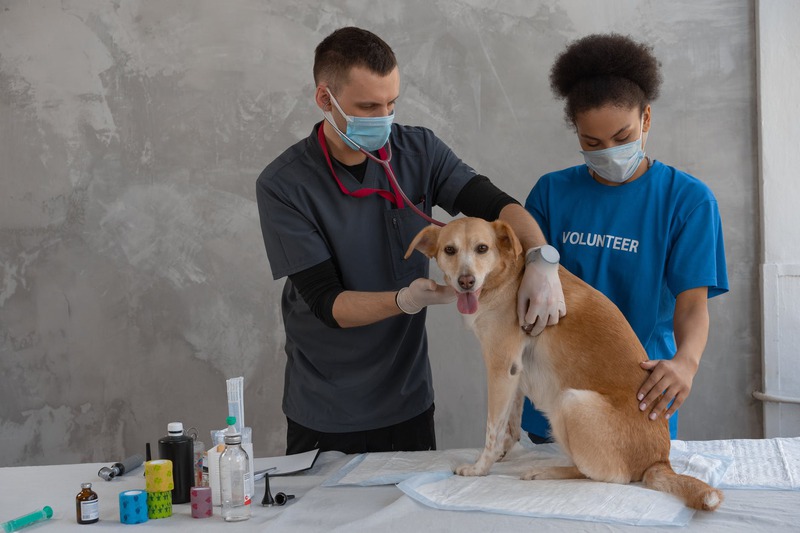Emergency Veterinary Care is the frontline service pet parents rely on during critical situations. The distinction of these professionals lies not only in their medical proficiency but also in their capacity to handle sudden, frequently severe cases involving our beloved pets. Responding to many situations, from automobile incidents to severe seizures, they provide immediate medical attention for distressed pets.
The Role of Emergency Veterinarians
Emergency veterinarians play a crucial role in pet healthcare, functioning like ER doctors who leverage their expertise to save lives around the clock. They are specially trained to rapidly assess injuries, stabilize patients, make a precise diagnosis, and execute immediate treatment plans to handle severe, often life-threatening conditions.
Treating Various Pet Injuries
Their work encompasses a diverse range of pet injuries:
- Fractures and Sprains
- Cuts, Burns, and Bites
- Choking and Breathing Problems
- Seizures and Loss of Consciousness
Importance of Timely Veterinary Care
Prompt veterinary care can often make a huge difference in your pet’s health and overall life span. Here are some key reasons why timely veterinary care is so important.
1. Early Disease Detection
- Description: Routine check-ups allow veterinarians to assess your pet’s health and identify potential problems early on.
- Value: Early detection of diseases like cancer, kidney disease, or heart conditions enables swift intervention, often increasing the chances of successful treatment and offering a better prognosis.
2. Vaccination and Preventive Care
- Description: Annual vet visits are an opportunity to update your pet’s vaccinations and initiate preventive measures against heartworms, ticks, and fleas.
- Value: These preventive actions can protect your pet from preventable but potentially life-threatening diseases and prevent parasite infestations.
3. Dental Health
- Description: Dental health is often overlooked in pets, but untreated dental issues can lead to serious illnesses like heart disease.
- Value: Regular vet appointments include dental check-ups that can detect and treat oral health problems, thus improving your pet’s overall health.
4. Nutritional Counseling
- Description: Veterinary visits can provide nutrition advice appropriate for your pet’s age, breed, and health condition.
- Value: Proper nutrition supports optimal growth in young pets, maintains health in adults, and can manage diseases and slow aging in senior pets.
5. Behavioural Issues
- Description: Changes in your pet’s behavior can indicate underlying health problems.
- Value: Regular visits to the vet can help identify and address these behavioral issues, ensure your pet’s well-being, and enhance your relationship with your pet.
6. Weight Management
- Description: Obesity is prevalent in pets and can lead to severe health conditions like diabetes, arthritis, and heart disease.
- Value: Regular vet visits include monitoring your pet’s weight and undertaking a suitable weight management plan, if necessary, which can significantly improve their health.
Processes and Procedures in Emergency Care
Knowing what to expect during an emergency veterinary visit can be a lifesaver. The initial reception at an after-hours emergency pet hospital is usually a quick triage to assess the urgency of the pet’s condition.
Emergency Procedures
Once the pet is stabilized, further tests may be done, and procedures are initiated based on these results. This may extend to surgeries, blood transfusions, or complex treatments during severe emergencies.
Aftercare: Post-Emergency Procedures
After an emergency visit to the vet, the aftercare and recovery phase is critical in ensuring your pet returns to health. Here are some key aspects of this process.
1. Medication Administration
- Description: The vet often prescribes medication to manage pain, prevent infection, or treat the underlying condition.
- Importance: Ensuring your pet takes its medication as directed is crucial for recovery.
2. Wound Care
- Description: If your pet has any wounds, the vet will provide instructions for cleaning and dressing them.
- Importance: Proper wound care can prevent infection and speed up healing.
3. Diet Adjustments
- Description: Depending on the situation, the vet may recommend a special diet or feeding schedule for your pet.
- Importance: A suitable diet can help your pet heal and regain strength.
4. Activity Restrictions
- Description: The vet might advise limiting your pet’s physical activity to allow for optimal healing.
- Importance: Overexertion could slow down the recovery or even cause further injury.
5. Follow-up Visits
- Description: Regular follow-up visits are vital to monitor your pet’s recovery and catch any complications early.
- Importance: The vet can reassess the situation during these visits and alter treatment plans if necessary.
6. Emotional Support
- Description: Recovery can be stressful for pets. Providing them with love and comfort can help reduce their stress and fear.
- Importance: A calm and supportive environment can aid in your pet’s recovery.
Home Care and Recovery: Veterinary Acupuncture
Pet parents can consider alternative treatment modalities, like acupuncture treatment for dogs asthma, for their pets as part of the home care plan. This traditional Chinese method is recognized and appreciated for its ability to relieve pain, stimulate healing, and improve pet respiratory problems.
Preventing Emergencies: Roles of Pet Owners
An integral part of preventing emergencies includes pet owners being proactive about their loved pets’ health. Routine health and wellness checks, a balanced diet, regular exercise, and a safe environment are pivotal in ensuring their overall well-being.
Cat & Dog Vaccination and Parasite Prevention
Among the ways to keep pets safe and healthy, vaccination is a primary preventive measure. Regular dog shots in Brentwood, TN, are common practices that pet owners should be aware of to protect their pets from various severe diseases. Regular deworming schedules and suitable parasite prevention methods are vital in ensuring your pet’s health and happiness.
Conclusion
Emergency veterinary care is an essential aspect of pet healthcare. These professionals’ dedication, expertise, and immediate response offer pet parents comfort and assurance during crucial times, leading to our beloved pet’s successful recovery and a happy, healthy life.





